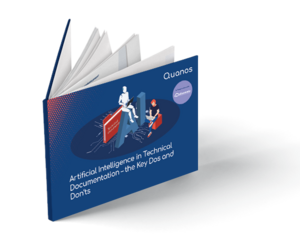Five Trends in Technical Documentation: What’s Around the Corner for Technical Writers in 2025
To secure and safeguard their market position, industrial companies need to not just be aware of the developments that await them in the coming months, but also to play an active role in shaping them. Join us as we take a look ahead to the trends that will be setting the pace in the technical writing sector in the new year.

Digitization, regulations, and declining orders are making for turbulent times for machine manufacturers
The current economic situation is giving manufacturers a hard time. But despite a lack of orders on the books, technical writers will find that they have their hands full in the coming months as they get to grips with new regulations, new technologies, and more besides.
Technical writing teams should be looking in particular at the following trends right now to make sure they get off to a flying start after this period of weak economic activity passes.
Trend #1: AI enhances efficiency in technical documentation
Strictly speaking, artificial intelligence (AI) in technical writing is not a trend, but is here to stay. Nonetheless, it tops our list of trends in the new year because 2025 could be an exciting time for AI thanks to the new AI regulation and growing potential uses.
The AI status quo in technical writing departments
We’re all aware of the benefits of AI tools – they range from automating repetitive tasks to revealing hidden knowledge in technical documentation.
As Tekom reports, an increasing number of AI functions are available to technical writers when generating content or optimizing existing content. In the short to mid-term, the aim is to integrate applications such as AI translations or AI-supported content delivery into authoring processes – but critical to achieving this is high-quality data.
Data quality is the challenge – documentation is the solution
For many companies, data quality is one of the biggest hurdles they face when implementing AI. Deloitte therefore recommends starting where a solid data basis already exists – such as with technical documentation. One example here would be the many US manufacturers creating better customer experiences by combining AI-based service manuals and augmented reality for more efficient remote maintenance.
How you can drive your AI projects forwards in 2025
In addition to a good database, you need software solutions that support AI functions for your AI projects. At Quanos, these include the following:
- Automating metadata: With ST4 AI Jetpack, your metadata efficiency is given a big boost. The cloud-based AI solution for SCHEMA ST4 analyzes your content and generates accurate, error-free metadata.
- Optimizing content: ST4 AI Writer suggests formulations to your authors when writing operating instructions or assists with structuring content, thereby reducing manual work and enhancing efficiency in technical writing.
- Using text modules: To enable technical writers to reuse text modules, ST4 Redundancy Checker identifies suitable content – this reduces translation costs and avoids redundancies, allowing greater efficiency in the migration of legacy data.
AI is creating new tasks for technical writers
To make sure that AI is used safely, the EU adopted the world's first AI regulation in 2024. Among its provisions, the EU’s AI Act stipulates that technical documentation will also be mandatory for AI systems.
Depending on the risk level posed by AI, companies with their own solutions must therefore produce documentation that is relevant for official audits, for example, which will result in fascinating new remits for technical writers.
White paper: AI in Technical Documentation – the Key Dos and Don‘ts

In this white paper, you will discover the tasks that artificial intelligence can take on in technical writing departments, from assisting with preparing texts to automatically assigning metadata. Its use is associated with both opportunities and risks. You will then learn what you need to look out for and what mistakes you should take care to avoid in our “dos and don'ts”.
Trend #2: Central platforms facilitate collaborative documentation
According to Bitkom, cloud computing is well on its way to dominating the business IT landscape: 81 percent of companies in Germany are already using it. Alongside cost savings and digital transformation, the move towards platforms and software-as-a-service is one of the principle reasons behind this trend.
Technical writing teams are also increasingly working with platforms and using digital systems as a single source of truth for their data. This brings with it the advantage that functions and services can be added at any time and helps technical writers to work together even more successfully.
Ready for digital publishing – with the cloud
In future, manufacturers will have to provide their product information in digital, interactive, and networked form due to regulatory requirements including:
- The Ecodesign Directive, which stipulates that manufacturers must provide their products with a digital product passport, so that users can maintain and dispose of them correctly.
- The new Machinery Directive that paves the way for paperless operating instructions.
- The NIS2 Directive and the Cyber Resilience Act, which result in new documentation obligations and security requirements that technical writers must take into account.
Cloud-based content management systems like SCHEMA ST4 not only make it possible to produce product information in compliance with the law, but also to distribute the documentation digitally and securely.
Trend #3: Accessibility makes documentation usable by all
Machines and plants are becoming increasingly complex. Technical writers must therefore formulate their content in such a way that it remains easily understandable and accessible for machine operators and service technicians.
Usability is set to become even more relevant in 2025, as Germany’s Accessibility Reinforcement Act (BFSG) comes into effect in June. While it is primarily B2C companies that will be affected, industrial companies will also have to make certain products, human-machine interfaces, and technical documentation accessible.
In addition to satisfying legal requirements, this also means that you meet the user’s needs:
- Safety guidelines and operating instructions that are readily understandable help to create safe working environments.
- Comprehensible information makes it easier for global teams to break down language barriers.
- By using uncomplicated language in technical documentation, you can position your company as an inclusive employer or enable faster onboarding for career changers.
Digitization helps you to make your documentation accessible and improve the usability of your information – for example with easy-to-understand graphics and videos or technologies such as virtual and augmented reality.
Trend #4: Documented knowledge mitigates the skills shortage
Mechanical engineering is experiencing a succession issue: in the last decade, the number of first-year students has fallen by a massive 45 percent. The lack of young talent and the loss of specialist knowledge arising due to generational change will remain a concern for companies in 2025.
Technical writers can help to overcome these challenges by documenting expertise in digital systems before long-serving specialists take it with them into their retirement. Using modern software solutions, knowledge can be prepared and managed in such a way that it is easily accessible and interactively usable for everyone.
How is the work of the technical writer developing?
According to the latest reports, the demand for technical writers remains high. What is changing, however, is their role. For example, the management of information and processes as well as the quality assurance of AI-generated content will become increasingly important, while technical writers will also need better IT skills and expertise in prompt engineering.
Trend #5: Digitization increases sustainability and efficiency in technical writing teams
The sustainability trend is enduring. Despite the economic challenges, 85 percent of German companies support the energy transition. Technical writing teams are also playing their part: with paperless processes, digital manuals, and energy-efficient publication systems, they are helping to reduce the ecological footprint.
However, sustainability in technical documentation doesn’t just mean doing away with paper; it also means making content timeless and long-lasting. Furthermore, technical writers reduce energy consumption through intelligent search functions and efficient version management.
Act now and adapt to trends faster
Many of the trends presented will remain relevant beyond 2025. With flexible software solutions, your technical writing team will be capable of reacting faster to new laws, economic fluctuations, changing user needs, and technological progress.
Quanos supports you with expertise and software solutions today and in the future – so that you can keep your finger firmly on the pulse.

